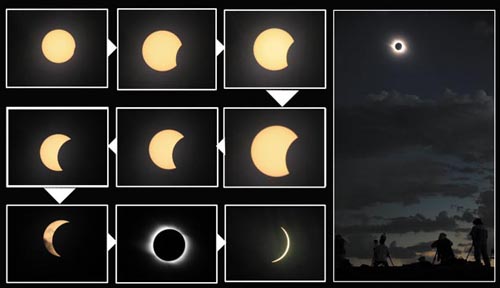|

|
|
The whole process of the total sun eclipse is seen in Yiwu, Xinjiang Uygur Autonomous Region, China, August 1, 2008. [Sina.com.cn] |
Thousands of astronomers and tourists witnessed a total solar eclipse on Friday evening in Yiwu County of west China's Xinjiang Uygur Autonomous Region. It lasted two minutes, according to the China National Astronomical Observatory.
In Yiwu, one of the best observation places, the eclipse occurred at 7:08 p.m. when the moon covered the sun, Zhao Gang, vice head of the National Astronomical Observatory under the Chinese Academy of Sciences(CAS), said.
Thousands of sky gazers from more than 10 countries gathered at an observation square that opened on Friday in Yiwu.
Zhang Bo, a middle school student who came from Shenzhen in the southern Guangdong Province with his teacher and classmates, was excited about the atmosphere. "My dream is to become an astronomer to explore the secret of the universe."
Carolyn Ng, a program manager and science education specialist from NASA (the National Aeronautics and Space Administration of America), said the weather was favorable and her observation was a "success." She and a crew of 12 members broadcast the solar eclipse live from Yiwu.
Yiwu, 500 km east of Xinjiang's capital Urumqi, began preparing for the tourist upsurge a year ago. "But the number of tourists still went beyond our expectations," said Zhou Jun, the local tourist bureau chief. Nearly half the sky gazers were sleeping in tents.
The CAS observatory had earlier announced that Hami in Xinjiang and Jiuquan in neighboring Gansu Province would be the best places in China to observe the eclipse.
The total solar eclipse occurred at 7:14 p.m. in Jinta County of Jiuquan, another ideal observation place in China. It lasted less than two minutes.
A group of more than 90 Japanese tourists witnessed the eclipse by Jinding Lake in Jinta County. "We are lucky that the weather was very nice," said one of the tourists.
The eclipse started from northern Canada and extended across northern Greenland, the Arctic, central Russia and western Mongolia before ending in northern China.
A solar eclipse occurs when the moon passes between the Earth and Sun, totally or partially blocking the Earth's view of the Sun. The next total solar eclipse will occur in China in January.
The solar eclipse on Aug. 1, the first in China in the new century, was visible in Chinese territory at 6:59 p.m. Beijing Time. Besides Xinjiang and Gansu, people in several other regions, such as Shaanxi and Hong Kong, could also see a total or partial eclipse.
Astronomers observed China was entering a high incidence period for solar eclipses. Four solar eclipses, two total eclipses and two annular ones, were expected to occur in the country over the next five years.
During the last century, 78 partial and 71 total solar eclipses were reported worldwide.
Chinese astronomers are believed to have been the first to record solar eclipses more than 3,000 years ago.
(Xinhua News Agency August 1, 2008)